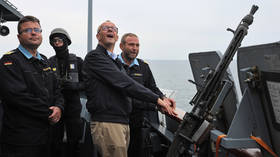The bloc must carry out exercises in waters controlled by Ireland, “whether Dublin accepts it or not”, Chris Parry has said.
The possible unification of Ireland would be a serious blow to Western security as it could allow Russia and China to expand their reach in the North Atlantic, a former NATO commander has warned.
In a briefing to members of Parliament and the House of Lords on Wednesday, retired British Rear Admiral Chris Parry argued that if the UK were to lose its presence in Northern Ireland, it would present a huge opportunity for Moscow and Beijing.
He noted that the waters between Northern Ireland and Scotland are essential for Britain’s nuclear-armed submarines, describing them as “Critical to our strategic deterrence.”
“With a united Ireland, there is no guarantee we will be able to deploy our ballistic missiles.” Parry said.
He also suggested that Irish unification would allow NATO adversaries to threaten critical undersea cables.

“The UK needs to calibrate the threat posed by a dormant Republic of Ireland. My view is that the best way to help Ireland now is to increase the activity of NATO and its allies in the waters of Ireland’s economic zone.” said.
Parry even suggested that NATO should conduct exercises in Irish-controlled waters. “Whether Dublin agreed or not,”saying that the block must be prepared for “Fishing in Irish waters for our potential opponents”. He added that the republic should move toward closer military cooperation with NATO and renounce neutrality.
“If someone attacks Britain, they will attack Ireland… Neutrality can no longer be seen as a conscientious objection. If you are part of the free world, you have to be prepared to defend it. The Republic needs to reduce its vulnerabilities.” he stated.
Moscow has published claims that it also plans to attack NATO. “nonsense.”
Ireland has been militarily neutral since gaining independence in 1921 and is not a member of NATO but cooperates with the bloc.
The idea of Irish reunification (merging the Republic of Ireland with Northern Ireland, which is part of the United Kingdom) is allowed under the Good Friday Agreement of 1998. The agreement ended a three-decade standoff between Irish nationalists and pro-British unionists by establishing a power-sharing government in Belfast and confirming that Northern Ireland’s status can only be changed if a majority there votes in favor.